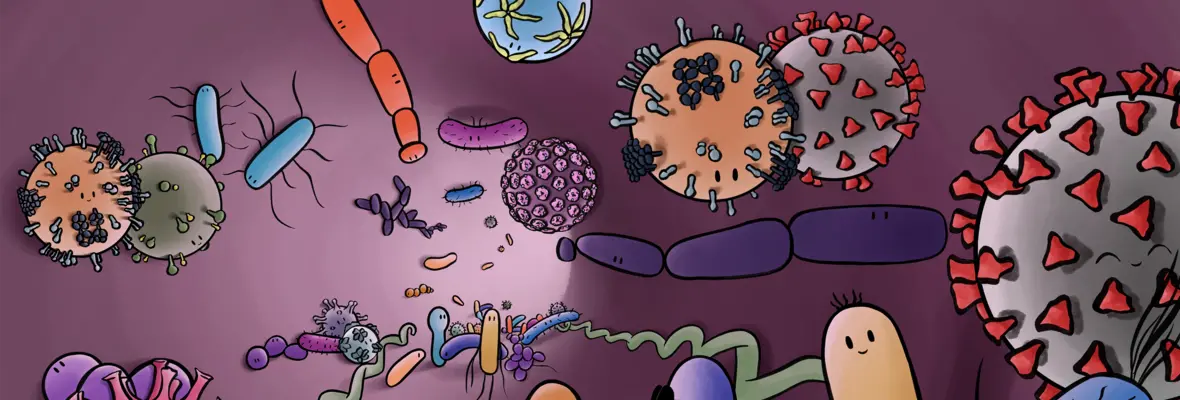7a Home
19 19 19 31 19 65 19 19 49 31 31 19 19 19 19 19 45Our Department
2 16eThe inhabitants of Earth are mostly microbes, and their activities are central to human welfare. Microbes can cause disease, but a properly functioning microbiome is essential for health. Microbes spoil food, but drive many forms of food production. Microbes mediate organismic decay, but catalyze numerous geochemical processes essential for life on Earth.
2 20aResearch in the Penn Microbiology Department focuses on infectious agents that threaten global health, with an emphasis on understanding molecular mechanisms and developing key new methods. Areas of focus include SARS-CoV-2, HIV, pathogenic bacteria of the airway and gut, cancer causing viruses, emerging infectious diseases, and the human microbiome. On the host side, faculty study many areas of immunology related to infection, including innate and adaptive immunity, tumor immunology and vaccine development.
1fPenn Micro on Bluesky
19 2e-
2e
-
51
3c
Friday, February 6, 2026
3f
9 19
Microbiology Seminar 🔬 19 Wednesday 2/11/26 12-1PM 18 CRB Austrian Auditorium 11 Sabra Klein, PhD 32 "SeXX matters for respiratory virus pathogenesis" 21 www.sabrakleinlab.org
-
51
3c
Friday, February 6, 2026
3e
9 19
Prokaryotic Seminar 🦠 15 Monday 2/9/26 4-5PM 15 209 Johnson Pavilion 1 38 Joel Babdor, PhD, Assistant Professor, Dept of Systems 2c Pharmacology and Translational Therapeutics 86 “Exploring Microbiome Communities and Molecular Cues Shaping Baseline Immune Variations in health and disease”
-
51
3e
Wednesday, January 28, 2026
42
9 25
NO Microbiology Seminar 🔬 1f on Wednesday 2-4-26
Departmental Events
d 37-
52
-
76
Prokaryotic Seminar
5
5
5
63
17
Monday, Februrary 16: 4pm in 209 Johnson Pavilion
1 20Kelsey O'Brien, John Lab
1 6d“Diverging substrate specificity of a Staphylococcal prodrug-activating hydrolase”
-
73
Virology Seminar
5
5
5
63
17
Tuesday, February 17: 4pm in 209 Johnson Pavilion
1 22Amber Abbott, Weitzman Lab
1 7e“Proteomic and spatial imaging screens to define how adenovirus alters cellular RNA binding proteins"
-
77
Microbiology Seminar
5
5
5
6b
2f
Wednesday, February 18th: 12pm in CRB Austrian Auditorium
1 22Geelsu Hwang, PhD :: UPenn
1 3e“Engineering-driven oral health research”
1 e
1 e
1 14
 b9
b9
 13
13
 f
f
 f
f
 f
f